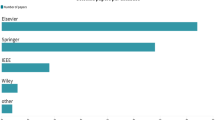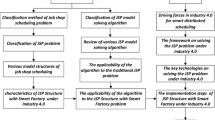Abstract
The fast evolution of the Internet of Things (IoT) marketplace demands real-time interactive services. Cloud computing systems aim to harness remote data center-based computing resources to perform these services instantly. However, these cloud systems fall short due to the distances from users to the data source, affecting response time and scheduling reliability. The newest drift is to integrate fog resources and cloud resources to perform data analytics in proximity to the edge end-users. However, the makespan and reliability are two prime concerns in such integration that requires attention. Most application placement policies in the literature do not consider makespan and reliability simultaneously. In this paper, we propose a hybrid multi-criteria decision-making (Hybrid-MCD) model to optimize the scheduling reliability and workflow makespan simultaneously. It formulates the problem as a bi-objective task scheduling problem that enhances the scheduling reliability and improves the service delivery time ratio of workflow tasks placed on computing resources. Furthermore, we formed a Deadline-aware stepwise Reliability Optimization (DARO) algorithm that maximizes the application’s execution time and reliability by adapting the reliability-recursive maximization algorithm and remapping workflow applications that are not on the critical path. The proposed algorithm’s performance is evaluated in a simulated cloud-fog environment using iFogSim. The results demonstrate that the algorithm is more efficient in optimizing makespan and system reliability jointly than other comparable algorithms.






Similar content being viewed by others
Data Availability
Data sharing not applicable to this article as no datasets were generated or analyzed during the current study.
References
Alqahtani F, Amoon M, Nasr AA (2021) Reliable scheduling and load balancing for requests in cloud-fog computing. Peer-to-Peer Network Applic 14 (4):1905–1916
Angel NA, Ravindran D, Durai Raj Vincent PM, Srinivasan K, Hu Yuh-Chung (2021) Recent advances in evolving computing paradigms Cloud, edge, and fog technologies. Sensors 22(1):196
Cao F, Zhu MM (2013) Distributed workflow mapping algorithm for maximized reliability under end-to-end delay constraint. J Supercomput 66(3):1462–1488
Cisco - Networking, Cloud, and Cybersecurity Solutions (2022) https://www.cisco.com/c/en/us/index.html. Accessed 10 June 2022
de Toniolli JLS, Jaumard B (2019) Resource allocation for multiple workflows in cloud-fog computing systems. In: Proceedings of the 12th IEEE/ACM international conference on utility and cloud computing companion, pp 77–84
Deng Z, Cao D, Shen H, Yan Z, Huang H (2021) Reliability-aware task scheduling for energy efficiency on heterogeneous multiprocessor systems. J Supercomput 77(10):11643–11681
Dogan A, Ozguner F (2002) Matching and scheduling algorithms for minimizing execution time and failure probability of applications in heterogeneous computing. IEEE Trans Parallel Distrib Syst 13(3):308–323
Garg R, Mittal M, Le HS (2019) Reliability and energy efficient workflow scheduling in cloud environment. Clust Comput 22(4):1283–1297
Goudarzi M, Wu H, Palaniswami M, Buyya R (2020) An application placement technique for concurrent iot applications in edge and fog computing environments. IEEE Trans Mob Comput 20(4):1298–1311
Huang H, Ye Q, Zhou Y (2021) Deadline-aware task offloading with partially-observable deep reinforcement learning for multi-access edge computing. IEEE Transactions on Network Science and Engineering
Ijaz S, Munir EU, Ahmad SG, Mustafa Rafique M, Rana OF (2021) Energy-makespan optimization of workflow scheduling in fog–cloud computing. Computing 103(9):2033–2059
IoT.Business.News (2020) Global iot device connections to reach 11.7 billion in 2020 surpassing non-iot devices for the first time
IoT Growth Demands Rethink of Long-Term Storage Strategies. EE Times Asia (2020) https://www.eetasia.com/iot-growth-demands-rethink-of-long-term-storage-strategies/
Jiang J, Li W, Pan L, Yang B, Peng X (2019) Energy optimization heuristics for budget-constrained workflow in heterogeneous computing system. J Circ Syst Comput 28(09):1950159
Kaur S, Bagga P, Hans R, Kaur H (2019) Quality of service (qos) aware workflow scheduling (wfs) in cloud computing: a systematic review. Arab J Sci Eng 44(4):2867–2897
Lee S, Lee SK, Lee S-S (2021) Deadline-aware task scheduling for iot applications in collaborative edge computing. IEEE Wireless Commun Lett 10(10):2175–2179
Liu Y, Xie G, Tang Y, Li R (2019) Improving real-time performance under reliability requirement assurance in automotive electronic systems. IEEE Access 7:140875–140888
Liu S, Yu M, Li M, Xu Q (2019) The research of virtual face based on deep convolutional generative adversarial networks using tensorflow. Physica A: Stat Mech Applic 521:667–680
Mahmud R, Koch FL, Buyya R (2018) Cloud-fog interoperability in iot-enabled healthcare solutions. In: Proceedings of the 19th international conference on distributed computing and networking, pp 1–10
Mahmud R, Pallewatta S, Goudarzi M, Buyya R (2022) Ifogsim2: an extended ifogsim simulator for mobility, clustering, and microservice management in edge and fog computing environments. J Syst Softw 190:111351
Mahmud R, Srirama SN, Ramamohanarao K, Buyya R (2020) Profit-aware application placement for integrated fog–cloud computing environments. J Parallel Distrib Comput 135:177–190
Mao M, Humphrey M (2012) A performance study on the vm startup time in the cloud. In: 2012 IEEE Fifth international conference on cloud computing, pp 423–430. IEEE
Medara R, Singh RS (2021) Energy efficient and reliability aware workflow task scheduling in cloud environment. Wirel Pers Commun 119(2):1301–1320
Memon I, Shaikh RA, Hasan MK, Hassan R, Haq AU, Zainol KA (2020) Protect mobile travelers information in sensitive region based on fuzzy logic in iot technology. Security and Communication Networks, 2020
Motlagh AA, Movaghar A, Rahmani AM (2022) A new reliability-based task scheduling algorithm in cloud computing. Int J Commun Syst 35(3):e5022
Nan Y, Li W, Bao W, Delicato FC, Pires PF, Zomaya AY (2018) A dynamic tradeoff data processing framework for delay-sensitive applications in cloud of things systems. J Parallel Distrib Comput 112:53–66
Nguyen BM, Binh HTT, Son BD, et al. (2019) Evolutionary algorithms to optimize task scheduling problem for the iot based bag-of-tasks application in cloud–fog computing environment. Appl Sci 9(9):1730
Nurelmadina N, Hasan MK, Memon I, Saeed RA, Ariffin KAZ, Ali ES, Mokhtar RA, Islam S, Hossain E, Hassan M et al (2021) A systematic review on cognitive radio in low power wide area network for industrial iot applications. Sustainability 13(1):338
Plank JS, Elwasif WR (1998) Experimental assessment of workstation failures and their impact on checkpointing systems. In: Digest of Papers. Twenty-eighth annual international symposium on fault-tolerant computing (Cat. No. 98CB36224), pp 48–57. IEEE
Qingzhen X u, Wang F, Gong Y, Wang Z, Zeng K, Qi L i, Luo X (2019) A novel edge-oriented framework for saliency detection enhancement. Image Vis Comput 87:1–12
Qingzhen X u, Wang Z, Wang F, Gong Y (2019) Multi-feature fusion cnns for drosophila embryo of interest detection. Physica A: Stat Mech Applic 531:121808
Raji MF, Li JP, Haq AU, Ejianya V, Khan J, Khan A, Khalil M, Ali A, Shahid M, Ahamad B et al (2020) A new approach for enhancing the services of the 5g mobile network and iot-related communication devices using wavelet-ofdm and its applications in healthcare. Sci Program, 2020
Rani R, Garg R (2022) Reliability aware green workflow scheduling using ε-fuzzy dominance in cloud. Complex Intell Syst 8(2):1425–1443
Saeedi S, Khorsand R, Bidgoli SG, Ramezanpour M (2020) Improved many-objective particle swarm optimization algorithm for scientific workflow scheduling in cloud computing. Comput Industr Eng 147:106649
Sharma R, Rani S, Memon I (2020) A smart approach for fire prediction under uncertain conditions using machine learning. Multimed Tools Appl 79(37):28155–28168
Stavrinides GL, Karatza HD (2019) A hybrid approach to scheduling real-time iot workflows in fog and cloud environments. Multimed Tools Appl 78 (17):24639–24655
Tang J, Jalalzai MM, Feng C, Xiong Z, Zhang Y (2022) Latency-aware task scheduling in software-defined edge and cloud computing with erasure-coded storage systems. IEEE Transactions on Cloud Computing
Tarafdar A, Debnath M, Khatua S, Das RK (2021) Energy and makespan aware scheduling of deadline sensitive tasks in the cloud environment. J Grid Comput 19(2):1–25
Tsai J-F, Huang C-H, Lin M-H (2021) An optimal task assignment strategy in cloud-fog computing environment. Appl Sci 11(4):1909
Wang P, Lei Y, Agbedanu PR, Zhang Z (2020) Makespan-driven workflow scheduling in clouds using immune-based pso algorithm. IEEE Access 8:29281–29290
Xu Q (2013) A novel machine learning strategy based on two-dimensional numerical models in financial engineering. Math Probl Eng, 2013
Xu Q, Huang G, Mengjing Y, Guo Y (2020) Fall prediction based on key points of human bones. Physica A: Stat Mech Applic 540:123205
Xu Q, Wu J, Chen Q (2014) A novel mobile personalized recommended method based on money flow model for stock exchange. Math Probl Eng, 2014
Yousefpour A, Fung C, Nguyen T, Kadiyala K, Jalali F, Niakanlahiji A, Kong J, Jue JP (2019) All one needs to know about fog computing and related edge computing paradigms: a complete survey. J Syst Archit 98:289–330
Yousif A, Alqhtani SM, Bashir MB, Ali A, Hamza R, Hassan A, Tawfeeg TM (2022) Greedy firefly algorithm for optimizing job scheduling in iot grid computing. Sensors 22(3):850
Zhou X, Zhang G, Wang T, Zhang M, Wang X, Zhang W (2020) Makespan–cost–reliability-optimized workflow scheduling using evolutionary techniques in clouds. J Circ Syst Comput 29(10):2050167
Author information
Authors and Affiliations
Corresponding author
Ethics declarations
Conflict of Interests
The authors declare that they have no conflict of interest.
Additional information
Publisher’s note
Springer Nature remains neutral with regard to jurisdictional claims in published maps and institutional affiliations.
Rights and permissions
Springer Nature or its licensor holds exclusive rights to this article under a publishing agreement with the author(s) or other rightsholder(s); author self-archiving of the accepted manuscript version of this article is solely governed by the terms of such publishing agreement and applicable law.
About this article
Cite this article
Khaleel, M.I. Hybrid cloud-fog computing workflow application placement: joint consideration of reliability and time credibility. Multimed Tools Appl 82, 18185–18216 (2023). https://doi.org/10.1007/s11042-022-13923-8
Received:
Revised:
Accepted:
Published:
Issue Date:
DOI: https://doi.org/10.1007/s11042-022-13923-8




